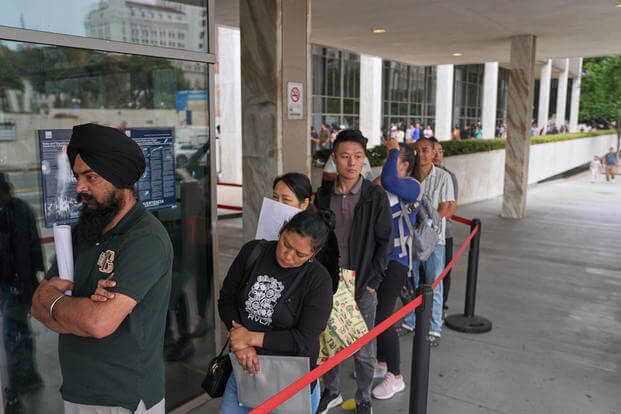The June 14 No Kings protests shattered records with over 5 million people flooding the streets across the United States, an unprecedented show of resistance against Donald Trump"s authoritarian policies. These protests, ignited by the recent violent actions from Homeland Security, particularly the ICE raids in Los Angeles, resonated deeply with communities, signaling a powerful shift in public sentiment against the ongoing assault on immigrant rights and social justice.
Mass Mobilization Across the Nation
According to Brookings, the discontent surrounding Trump"s administration has reached a boiling point, culminating in a wave of protests that swept through all 50 states. The breadth of these demonstrations is a testament to the growing urgency among citizens who are fed up with the administration"s reactionary agenda.
Significant Turnouts Reflect Diverse Movements
From the Twin Cities to Burlington, the No Kings protests showcased a rich tapestry of solidarity movements. In the Twin Cities, despite the tragic assassination of local leaders, demonstrators gathered in droves, with signs addressing not only Trump’s policies but also international issues like the plight of Palestine. Paul KD reported on the increased inclusivity of the crowd, highlighting a shift towards a more diverse representation compared to earlier protests.
Burlington, Vermont, saw an astonishing turnout of 16,000 people in a town of just 40,000, as reported by Ashley Smith. The coalition of groups, including the Vermont Coalition for Palestinian Liberation and Migrant Justice, illustrated the intersectionality of the struggle—an essential aspect of today"s movements. The rally was punctuated by a powerful die-in organized by the Resister Sisters, creatively linking the fight for healthcare, education, and peace with the urgent need to resist authoritarianism.
Protests as a Response to State Violence
The protests were not just about opposition to Trump but were also deeply rooted in the immediate threats posed by state violence against marginalized communities. Reports from the demonstrations in New Haven and Hartford showed a significant anti-ICE sentiment, fueled by the violent raids that targeted immigrant families. Connecticut’s rapid response network, as noted by Eric Maroney, underscores the necessity for communities to document and support those targeted by ICE, further emphasizing the critical intersection of immigration rights and civil liberties.
Grassroots Organizing in Action
The grassroots organizing that took place leading up to the No Kings protests reflects a growing awareness of the need for sustained activism. In Winston Salem, NC, for instance, the coalition of groups, including the Greensboro Revolutionary Socialists and the Triad Workers’ Assembly, highlighted how even events like Pride could be transformed into platforms for political expression. Participants used their signs to condemn Trump’s policies and connect with broader struggles, making it clear that the fight for LGBTQ+ rights cannot be separated from the fight against systemic oppression.
\n\n
LA Detention Center Guarded by Marines Shows Profound Impact ...
Challenges and Opportunities Ahead
While the protests were historic, they also exposed challenges within the movement. In cities like New York, the character of the demonstrations was noted to be largely liberal, with many participants from economically privileged backgrounds, as reported by Hank Kennedy. This raises critical questions about how to elevate the voices of those most impacted by Trump’s policies, including working-class communities and people of color. The dichotomy of participation suggests a need for deeper conversations about inclusivity and the focus of future actions.
Building Momentum for Lasting Change
The No Kings protests are a vital step toward building a broader movement that goes beyond electoral cycles and seeks systemic change. As noted in a recent piece by The New York Times, the ongoing protests serve as a reminder that dissent is a powerful tool for democracy. The challenge now lies in harnessing this momentum to push for policies that prioritize environmental justice, immigrant rights, and social equity.
As communities continue to rise up, the stakes are higher than ever. The No Kings protests have ignited a flame of resistance that must be sustained and nurtured to ensure a future where justice and equality prevail over tyranny and oppression.

![[Video] Anti-ICE Protester Pepper Sprayed as CBP Agents Disperse Crowd in Minneapolis](/_next/image?url=%2Fapi%2Fimage%2Fthumbnails%2Fthumbnail-1768260677127-y71sb7-thumbnail.jpg&w=3840&q=75)

![[Video] Several injured as U-Haul truck drives through Iranian protestors in Los Angeles](/_next/image?url=%2Fapi%2Fimage%2Fthumbnails%2Fthumbnail-1768176682028-q95y6j-thumbnail.jpg&w=3840&q=75)
![[Video] Scuffle breaks out between Trump supporters and Anti-ICE protesters in Times Square](/_next/image?url=%2Fapi%2Fimage%2Fthumbnails%2Fthumbnail-1768165958203-hgcgb-thumbnail.jpg&w=3840&q=75)


![[Video] Gunfire between Iraqi security forces and Sadr militias in Baghdad](/_next/image?url=%2Fapi%2Fimage%2Fthumbnails%2Fthumbnail-1768343508874-4redb-thumbnail.jpg&w=3840&q=75)
